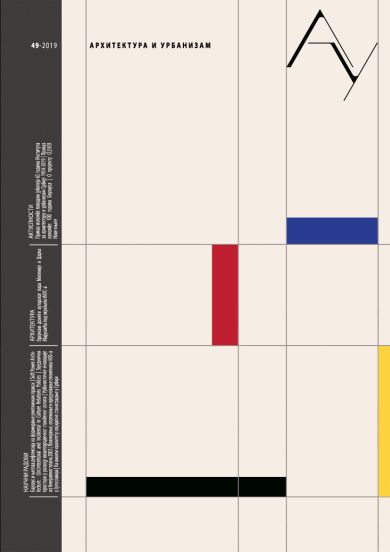Soft Power Architecture: (Un)intentional and Incidental in Culture Relations Policies
Sažetak
States' cultural policies for international relations take various forms, both intangible and tangible. This paper will focus on the latter, namely, exported architectural manifestation utilized as cultural negotiation tools. Architecture is viewed and examined as a cultural resource, subsequently having the power to influence bilateral relations Presenting a new term, ‘soft power architecture’ as conceived, exported, and state-controlled spatial manifestation, with a clear set of goals inscribed within cultural relations policies. These typologies have a profound impact and yet the policy makers remain unbothered by the importance of the said cultural resources. Requirements of the re-conceptualization of the state's policies regarding the planning, implementation and management processes for diplomatic-consular outpost will be discussed. Lastly, the case study of the new Japanese embassy in Belgrade, Serbia, will be examined, noting particularities of its processes, arguing an unintentional paradigmatic shift, providing a theoretical and methodological framework for future research.
Reference
Berridge, G. R. 2015. Diplomacy: Theory and Practice.
Basingstoke: Palgrave MacBlagojević, Lj. 2007. New Belgrade: Disputed Modernism (Serbian: Novi Beograd: Osporenimodernizam). Belgrade:Zavodzaudžbenike.
Butler, C. 2014. Henri Lefebvre: Spatial Politics, Everyday Life and the Right to the City. Abingdon-on-Thames: Routledge-Cavendish.
Castells, M. 1977. The Urban Question: A Marxist Approach (Social structure and social change). Cambridge, MA: MIT Press.
Cull J. N, ed. 2009. Public Diplomacy: Lessons from the Past Figueroa, Press Los Angeles [Online] Retrieved 21 January, 2017, from: https://uscpublicdiplomacy.org/sites/uscpublicdiplomacy.org/files/useruploads/u35361/2009%20Paper%202.pdf
Dale, P. 2011. The Myth of Japanese Uniqueness. New York: Routledge.
HristićDanilović, N. 2013.Bezbednosturbanihprostora [Safety of Urban Public Spaces].Belgrade: Orion Art
Ignjatović, A. 2007. Jugoslovenstvo u arhitekturi 1904-1941[Yugoslavian in Architecture 1904-1941].Belgrade:Građevinskaknjiga
Iriye, A. 1997. Cultural Internationalism and World Order. Baltimore: Johns Hopkins UniversityPress.
Kawamura, Y. 2018a. Beyond Cultural Diplomacy: The Study of International Cultural Relations (ICR)– A New Perspective of Cultural Policy Research in a Globalized World. Paper submitted to the 10th International Conference on Cultural Policy Research (ICCPR 2018). [Online]:
Kawamura, Y. 2018b. Experts in Cultural Policy-Making in Japan: Two Expert Networks and the Making of the Basic Act on the Promotion of Culture and the Arts (BAPCA). Bulletin of the Faculty of Humanities, Seikei University No.53 (2018) 47 [Online]:
Kawamura, Y. 2016. Methodological Duality and Conceptual Plurality of Culture in International Relations: Towards Collaboration of Cultural Policy Research and International Relations. Bulletin of the Faculty of Humanities Seikei University No. 51 (2016). [Online]:
https://researchmap.jp/?action=cv_download_main&upload_id=132512
Loeffler, C. J. 2011. The Architecture of Diplomacy. Building America’s Embassies. New York: Princeton Architectural Press
Mayo, J. 1996.The Manifestation of Politics in Architectural Practice. Journal of Architectural Education, 50(2): 76-88. Taylor & Francis, on behalf of the Association of Collegiate Schools ofArchitecture. [Online]
Mingst, Karen and Arreguín-Toft, Ivan 2014.Essentials if International Relations, New York:W.W.Norton& Company
Muratovski, Gjoko 2014.The Burden of Ethics: the Use of Design and Architecture as Political Propaganda, Peer Reviewed Proceedings of 5th Annual Popular Culture Association of Australia and New Zealand (PopCAANZ), Hobart 18-20, pp. 45-53. ISBN: 978-0-646-93292-7 [Online]. Retrieved January 25, 2017 from: http://www.academia.edu/19835843/The_Burden_of_Ethics_The_Use_of_Design_and_Architecture_as_Political_Propaganda_Conference_Paper_
Nye, J. 2004. Soft Power: The Means to Succeed in World Politics. Cambridge, MA:PublicAffairs.
Radović, D. 2015. Measuring the non-Measurable: Public-Private Interface, Mn’M edition Tokyo. Tokyo: flick Studio and IKI
Vasiljevic Tomic D. Nikezic A. Ciric D. 2013. Negotiating Cultural Identity Through the Architectural Representation Case Study: Foreign Embassy in Belgrade. FACTA UNIVERSITATIS Series: Architecture and Civil Engineering 11(2): 113–124
Yoshino, K. 1992. Cultural Nationalism in Contemporary Japan: A Sociological Enquiry. London: Routledge.
Žižek, S,ed. 1994. Mapping Ideology. London: Verso.

